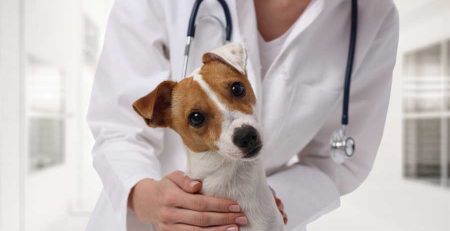Should I Take My Dog to the Vet? When It’s Time to Go to the Vet?
Americans love their pets like children. Nearly 38.4 percent of American households have dogs. These pet owners spend about an average of $126.19 on their pet friends each month.
Besides your pet’s annual exam, there are times your dog may be sick or acting strangely. If you are wondering “should I take my dog to the vet,” read on to know when it’s time.
Not Eating
This is a judgment call, but if your dog suddenly stops eating, this could be a sign something is wrong. Some dogs are a little more lackadaisical about food than others, so you know your pet best.
If your dog goes more than a day without eating, you should take your dog to the vet. This could be a sign of digestive issues or an obstruction.
The same goes true for the opposite. If your dog is attempting to eat food more food than normal, this could also be another issue. It is not an emergency, but you should probably see a vet to make sure there is not an underlying issue.
Vomiting or Diarrhea
A dog that just vomits a few times or has loose stools for a short period, may simply need to rest. However, if the dog is vomiting or has diarrhea repeatedly, it may be at risk for dehydration.
It is not as concerning for your dog to vomit 2-3 times within 10 minutes and then be fine. If your dog vomits three or more times over a period of eight hours, you should be worried.
If there is any blood in either, you should take your dog to the vet immediately.
Breathing Difficulties
If your dog is having any issues breathing, this is a veterinary emergency. This includes difficulty breathing, making weird noises when breathing, or puffing lips when he or she breathes.
Every dog pants on a hot day or after exercising, but the breathing should return to normal after resting.
Drinking More Water
If your dog is drinking more water without recent exercise or warmer weather exposure, this is a possible sign of diabetes, kidney disease, or other medical conditions. You should watch for excessive thirst that lasts longer than a day. Keep track of how often you fill-up the water bowl compared to normal.
Sudden Weight Loss
No matter the size of your dog; a sudden weight loss is a concern and is a reason to take the dog to the vet. An overweight dog that loses weight unexpectedly and quickly is also a cause for concern.
It may be hard to determine what is excessive weight loss. If your dog has lost about 10 percent of his or her body weight without any intervention, you should contact your vet and not wait for a routine vaccination and wellness visit.
Lethargy
If your dog is more sluggish or tired than normal, that could be a sign something is wrong. Is your dog all of a sudden disinterested in playing or walking? Your dog could simply be sore or tired when the weather warms up, but if this persists for more than two days, you should take your dog to the vet.
Red or Cloudy Eyes
If your dog has any unusual discharge coming from the eye, there could be an injury, like a retina scratch, or infection. You should also look for cloudy or red eyes. If your dog is pawing at her eyes or squinting, you should keep an eye out.
Eye diseases can progress quickly, so don’t wait too long. Issues in one eye could mean an infection or injury. Issues in both eyes can be a sign of more systemic issues like allergies or other health concerns.
Aggressive Behavior
Any change in your dog’s behavior is a sign something isn’t right. Just like you may get cranky when you aren’t feeling well; the same holds true for your dog.
If your dog suddenly barks, growls, or paces more, it could be more than a behavioral problem. It could be a sign your dog is in pain. You should make sure there isn’t an underlying issue for a change in behavior because dogs can’t always tell you when they aren’t feeling good or are in pain.
Skin or Coat Changes
Dry skin and dull coats can be a sign of allergies. Your vet can help determine what is causing allergies and give you suggestions to help relieve your dog’s discomfort. Your vet can also give you medicine to help your dog feel comfortable if you are trying to determine the cause of allergies because you may have to do a process of elimination.
Emergency Visits
If your dog is suffering from any of the following, you should contact your vet immediately or visit an emergency after hour vet.
- Unable to stand
- Seizure
- Sudden collapse
- Labored breathing
- Hard or swollen abdomen
- Unconsciousness
- Open wounds
- Trauma such as a fall or getting hit by a car (even if he seems ok)
- Whining or shaking suddenly
- Vomiting blood
- Ingesting poison
- Pale gums
- Disoriented
- Unable to deliver puppies
- Inability to pee
- Trying to vomit with nothing coming up
- Bleeding from nose, eyes, or mouth
These are signs that you shouldn’t wait. Your dog needs immediate attention.
Should I Take My Dog to the Vet?
If your dog is exhibiting any of these non-emergency symptoms and you are still wondering “should I take my dog to the vet,” follow your instincts. You know your dog best. Sudden changes are disconcerting, so you should act how you see fit.
A visit to the vet can help you feel at ease. No one wants to see their beloved pet in pain, so your vet will give you suggestions to help your dog feel better and be sure there are no medical conditions you should worry about.
If you are looking for a vet in the Toledo area, call us at 419.824.8177 or contact us today. We are here to answer your questions and help you take the best possible care of your canine.
We offer CareCredit and other payment options to help you pay for healthcare expenses.









